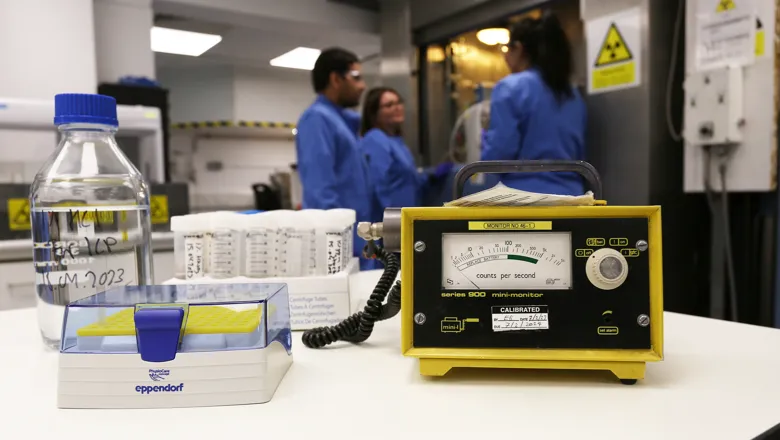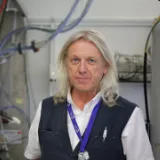Radiochemistry research for nuclear medicine has, in years gone by, typically shared lab space with Good Manufacturing Practice (GMP) laboratories where radiopharmaceuticals are prepared for human use. Increasingly stringent regulation means researchers find access to the facilities more and more restricted. The CARL facility fills this gap, providing lab space and equipment strictly for non-GMP preclinical radiochemistry, the first such facility for use by King’s and other UK researchers.
Professor Phil Blower, Professor of Imaging Chemistry and former Head of Department of Imaging Chemistry and Biology
05 July 2023
Meet CARL: New Radiochemistry Laboratory opening in St Thomas' MedTech Hub
The School of Biomedical Engineering & Imaging Sciences has opened a new research centre, the Cyclotron and Radiochemistry Laboratory (CARL).

A new national research-dedicated centre located within St Thomas’ Hospital as part of the King’s and St Thomas’ MedTech Hub, the facility will specialise in radionuclide production and radiopharmaceutical chemistry for preclinical applications. CARL is a multi-user facility, available to both academia and industry.
Until now, there has been no dedicated, non-GMP-regulated radiopharmaceutical research facility in the UK able to handle high levels of radioactivity, a bottleneck for domestic radionuclide production and radiopharmaceutical research.
The initial upgrade of the CARL laboratory facilities was funded by a £1m equipment grant from the Engineering and Physical Sciences Research Council (EPSRC), awarded to Prof Tony Gee, Prof Alexander Hammers, Prof Phil Blower, Dr Karin Nielsen and Dr Julia Blower, with significant additional support from King’s College London Estates and Facilities.
The Medicines Discovery Catapult (MDC), funded by Innovate UK, is a national centre of excellence in drug discovery with a remit to support the UK life sciences community. MDC engages the community through collaborative working. We are addressing systemic problems and bottlenecks and using innovative technologies to enable “fast to patient” medicines discovery. Access to specialist laboratories and skills is critical to the success of such a mission. The CARL facilities will provide a springboard into the translation of innovative research programmes that the MDC can facilitate access with our partnered research programmes.
Dr Juliana Maynard - Head of Translational Imaging at Catapult Medicines Discovery
The facility houses equipment for high-activity radionuclide production and radiochemistry development including hot cells, automated synthesis equipment and specialist analytical equipment.
The 11 MeV cyclotron that originally launched the KCL and GSTT PET Centre in 1991 has also been refurbished as part of the CARL facility. It will be used for making radionuclides for further research onsite in CARL and the Department of Imaging Chemistry and Biology, as well as small-scale supply to research labs across the UK. The centre will also enable hands-on training and teaching on site.
Radionuclides for Health UK has been advocating for better radionuclide supply in the UK to support research. The CARL facilities provide the opportunity to develop a whole range of radionuclides that would otherwise have to be imported or would not be available at all for UK researchers. Specifically, we have formed national user groups for two of the radionuclides that will be developed in the CARL lab, iodine-124 and lead-203, and these researchers are eager to use these radionuclides to accelerate their research programmes.
Dr Jennifer Young, PhD, NCITA Imaging QC/QA Team, Radionuclides for Health UK
CARL is now open. For more information on the facility or to arrange a tour visit the CARL webpage.


